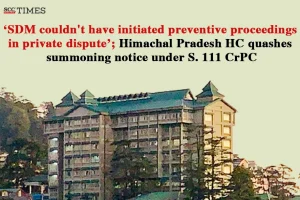Himachal Pradesh High Court: In the present petition, the petitioner challenged the order of the Sub-Divisional Magistrate (‘SDM’), Una, who had summoned him under Section 111 of the Criminal Procedure Code, 1973 (‘CrPC’) in a private dispute, after believing that there was a possibility of breach of peace. A Single Judge Bench of Rakesh Kainthla, J., quashed the order passed by the SDM, observing that it failed to meet the requirements of Section 111 CrPC and that the SDM could not have initiated the preventive proceedings in a private dispute.
Background:
The police filed a complaint under Sections 126 and 169 of the Bharatiya Nagarik Suraksha Sanhita, 2023 (‘BNSS’) against two accused who had allegedly attacked the informant with a darat on 30-10-2024 and abused and threatened to kill her. Upon investigation, it was found that the dispute pertained to taking the tractor through the field. The parties had sought time to settle the dispute, but it remained unresolved. One of the accused frequently abused the informant and her family and they had an apprehension of danger from him.
The SDM, holding that a possibility of breach of peace existed, ordered that a notice be issued to the accused persons to show-cause why they should not be bound to keep peace for a period of six months without surety in the sum of Rs 20,000. On 30-01-2025, the informant and her daughter-in-law stated that the petitioner and four other people were also involved in the quarrel, and they both feared for their lives and prayed that action should be taken against the named persons. The SDM, believing that there was a possibility of breach of peace, issued notice under Section 111 CrPC to the named persons as well.
Aggrieved by the SDM’s order, the petitioner prayed for it to be quashed for being without jurisdiction and arbitrary. He stated that his name was not mentioned in the complaint and even the police did not find him involved in the incident, but his name was included based on vague statements. The petitioner’s counsel submitted that it was a private dispute between the parties and the SDM lacked jurisdiction to initiate the proceedings. It was further submitted that the SDM did not pass an order under Section 130 BNSS, mentioning the number of sureties, the amount of the bond and the period for which the bond was to remain in force.
However, the State asserted that the SDM came to know that a conflict between the parties had occurred, and an FIR dated 04-12-2024 was registered. The informant had suffered two simple and one grievous injury, and the aggrieved parties approached the SDM through their counsel for immediate relief. It was contended that the SDM could have initiated the proceedings based on credible information received from any source and thus, there was no infirmity in the order passed by him.
Analysis and Decision:
The Court relied on Christalin Costa v. State of Goa, 1992 SCC OnLine Bom 252, wherein it was held that a dispute between two private individuals did not lead to a breach of the public peace, but was merely a problem of law and order and hence, it did not fall within the purview of Section 107 CrPC. The same position was reiterated in Perswami Kandswami Devendra v. Sr. Inspector of Police, 2003 SCC OnLine Bom 251, wherein it was held that “domestic quarrels and petty quarrels between neighbouring persons which did not have a long life were not the subject matters of the actions to be taken in view of Section 107 of the Code. The energy and time of the public servant concerned should not be wasted on such trifling matters for satisfying personal vendetta or for the purpose of giving lessons to each other”. The Court also referred to Asha Pant v. State, 2008 SCC OnLine Del 367, where it was observed that the proceedings under Section 107 CrPC should not be initiated in a private dispute.
The Court observed that the dispute was between two private parties, and the SDM had erred in taking its cognizance. In the notice issued by the SDM, he did not specify the substance of the information, the amount of the bond, the number of sureties or the period for which the bond was to remain in force. Therefore, the order did not comply with the requirements of Section 111 CrPC. The Court relied on Mohammed Sadiq Abdul Khalil Patel v. V.Y. Choughule, 2002 SCC OnLine Bom 1022, wherein it was laid down that where the order did not mention the period or the amount, it was bad.
The Court, referring to Lovely v. State of Kerala, 2023 SCC OnLine Ker 7567, wherein it was observed that preventive proceedings were not meant to punish a person for the crimes committed by him, concluded that it was impermissible to initiate the action based on the registration of the FIR. The SDM had filed an affidavit opposing the petition and justifying his order, but the Court, while following Mohinder Singh Gill v. Chief Election Commr., (1978) 1 SCC 405, where the Supreme Court had held that a statutory authority could not justify its order by furnishing an affidavit, observed that no such affidavit could be filed by the SDM.
Consequently, the Court observed that the SDM’s order summoning the petitioner could not be sustained and ordered it to be set aside.
[Ajay Thakur v. State of H.P., 2025 SCC OnLine HP 4728, decided on 17-09-2025]
Advocates who appeared in this case:
For the Petitioner: Sanjeev Kumar Suri, Advocate.
For the Respondents: Sunaina Chaudhary, Deputy Advocate General, Karan Kapoor, Advocate.

